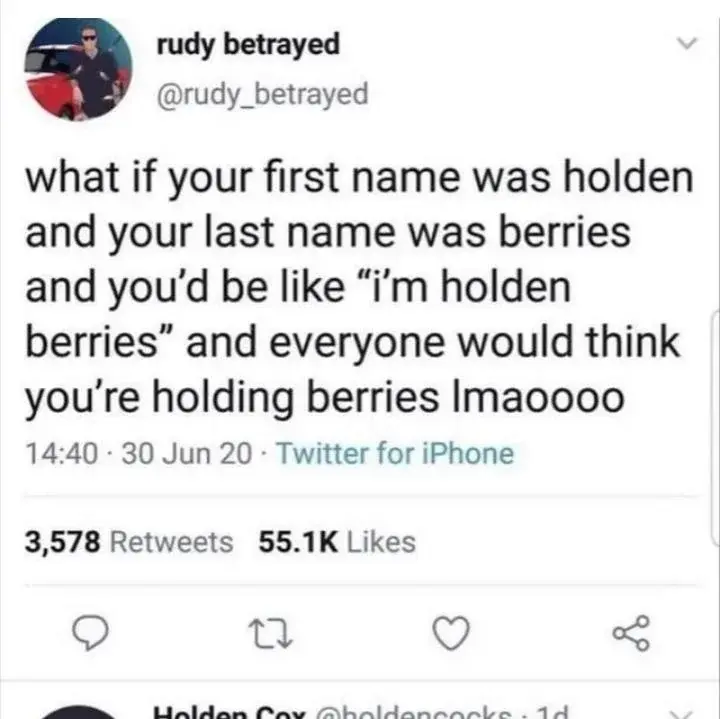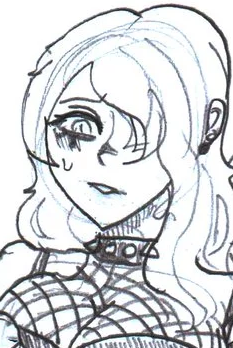Something I'm kind of struggling to wrap my head around. Is there a way for multiple word given names to work in English? Have you ever seen it done well? Just from a grammatical standpoint, it seems very difficult to construct sentences around a character with a name that is made up of multiple normal english words.
I don't even have any examples of such names yet because while I have the concept of a world in which names are supposed to be very directly and unambiguously meaningful, I haven't come up with one yet that doesn't completely fail a basic "Hello, my name is" test
Basically, how do I break English name rules without it sounding 110% fucked up?
I do wonder how they get shortened. In another language "strong oak tree in the winter" might be one or two syllables, but it would be a mouthful in English.
If you were to name yourself "top poster" people might call you "top" or "poster" or maybe "ster".
There are baby name pages that will break down the etymology and origins of thousands of names. Fun fact: Tiffany sounds modern but it's actually medieval French.
Iana linguist, but apparently within a given language contractions and shortening and dropping parts of words happen in consistent ways so you can look at a modern word and the old word it was constructed from and trace how the changes happened.
Another fun fact: pretty much any moder name ending in "El" is a biblical hebrew name - Michael, Daniel, etc. I think Michael means "who is like god?" But i'd have to look it up. "El" was one of the eupmemistic names used to describe god back in the day.
Semantically, "El" is a bit like Zeus's need to fuck everything. It's meant to metaphor how all derives from one.
so i don't think you really can break the naming conventions without it sounding weird but there is precedent for this in english. you might be familiar with the concept of virtue names (grace, charity, hope, etc).
per wikipedia:
Some Puritan virtue names were compound imperatives, such as "Search-the-scriptures" or "Praise-God". An example of the use of "Praise-God" as a name is Praise-God Barebone, whose son Nicholas may have been given the name If-Jesus-Christ-had-not-died-for-thee-thou-hadst-been-damned.
There's a pasta of Millenial versions of this. I think one of them was like Curse-God-and-Walk-Backwards-In-To-Hell Smith.
https://www.google.com/amp/s/variablejabberwocky.tumblr.com/post/166362371547/motorizedduck-thischick25/amp
Found it.
Ooh, imperatives as names is kinda badass actually. Some very good inspiration there.
For Surnames, there's Jennifer Government. But for the whole names, Terry Pratchett's Wee Free Men may be more of what you're looking for.
Oh God, I realise gamer tags and forum profile names are often this. Help
Maybe you could look at how traditional Native American names are used? I don’t know, but that’s a possible direction.
Yeah, that would be a good start. I should probably read some biographies about some people with fun Native American names and just get used to seeing names like that used, maybe my attempts wouldn't look so weird then.
There is a long history of indigenous names translated into English as phrases. Red Jacket, Dances with Wolves (lmao) etc.
There is a long history of indigenous names translated into English as phrases. Red Jacket, Dances with Wolves (lmao) etc.
Yeah, this is exactly the kind of thing I'm thinking of, but I guess there's a fine line between "valid name" and "word salad" and there aren't necessarily any hard rules you can pin down about which side a name is going to fall on. Or at least, that I can pin down. Maybe if I resurrected Tolkien he could figure it out for me, but I'm only a novice juche necromancer and I still struggle with rats.
you'd be shocked what you can get used to. The Culture books have Minds with phrase-names that integrate seamlessly with plain english
Yeah but normal people are going to look at you weird when you introduce yourself as "so much for subtlety hyde-smith" or "Very little gravitas indeed williams"
Hmm, that sounds like a good start. Any chance you could give an example of these names being used in normal English sentences without it sounding all fucked up?
I guess maybe phrases-as-names only sound completely fucked up to me while I'm trying to write them, and that if I just suck it up and write the story they'll still read as names to someone going in without expectations.
A couple of famous examples
Skink-in-tree's-shade
Morning-star-steals-away-clouds
Frodo-of-the-Nine-Fingers
Cher
Megan-thee-Stallion
Frodo is his name, of the nine fingers is just an epithet.
Fun fact: Frodo is just his name in Westron, the common language. His real name in Hobbitish is Maura Labingi. In Sindarin it was Iorhael, which is just Maura translated (wise by experience).
English is an isolating language according to morphemic grammar, so that's one thing that makes it unwieldy.
The closest thing we have is stuff that's been passed down from Old English, where the words have faded but the names remain.
Just ask "He-Who-Guards-Wealth" over here- or you can call him "Edward" for short.
It doesn't matter what the name is these days, people are going to cut it short to one syllable or add "ee" to the end. Edward will become Ed or Eddy in no time. William becomes Will or Willy.
Names aren't for us. They're for the convenience of other people. They need a quick way to tell us from others. Thank goodness Mom gave me a one syllable name.
Every headline about Reality Winner was very hard for me to understand
Joe-Bob
Billie-Jo
Mary-Jean
Joe-Jack
Talula Does The Hula In Hawaii
It might be easier to do if you use a phrase where one or more initials can serve as homophones.(E.G. Will U. Merrimee or, of course, I.P. Daley)












